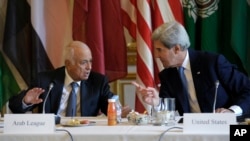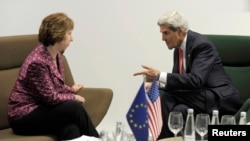U.S. Secretary of State John Kerry says the United States and its allies are not seeking to "take over" Syria’s civil war by carrying out an anticipated American-led air strike to stop President Bashar al-Assad's regime from using poison gas again.
But he said the alleged chemical attack on August 21 that killed more than 1,400 people - including 426 children - in areas outside Damascus populated by opposition supporters had crossed an “international, global red line.”
Speaking in Paris Sunday after meeting Arab League ministers to seek support for air strikes in Syria, Kerry said the Obama administration is distributing videos of the attack to help convince Americans and Congress to back a military intervention against the Syrian government.
He said the videos make clear the attack killed "real people, real children" and is not something Americans can ignore.
Kerry said Arab governments would be making decisions on whether to assist a possible U.S.-led air campaign within the next 24 hours.
He said that because Assad has used poison gas multiple times and has one of the largest stockpiles in the world, the U.S., Qatar and a growing number of allies are "certain" they must act to ensure he never uses chemical weapons again.
In an interview with CBS television to air Monday, Assad denied he had ordered the August 21 attack and said evidence was not conclusive it had even taken place. He said he is concerned that an air strike on Syria would degrade his military and tip the balance in the conflict.
Germany's Bild am Sonntag newspaper Sunday cited German intelligence in reporting that Syrian brigade and division commanders had been asking the Syrian presidency to allow them to use chemical weapons for more than four months, but permission had always been denied.
German intelligence officers suggested that could mean Assad may not have personally approved the attack.
In Washington, more bipartisan, classified briefings for Congress on the situation in Syria are set for Monday and Tuesday -- which Kerry said he would participate in.
"The vast majority of members of Congress - House and Senate - are undecided. And that's why the videos are being shown and the briefings are taking place," Kerry said.
The U.S. Congress is expected to vote on possible U.S. action against Syria in coming weeks. A key Senate panel voted last Wednesday in favor of action.
President Barack Obama takes his case for targeted military strikes on Damascus directly to the American people in a televised speech Tuesday.
Earlier Sunday, British Foreign Secretary William Hague said he believes there should be a strong response to the use of chemical weapons in Syria, despite a British parliament vote that rejected joining military action against the Assad government.
Hague said "the use of chemical weapons in the 21st century is an evil that we have to stand up to" and that the U.S. is seeking a "limited, proportionate response to the use of chemical weapons to try to deter the use of [such] weapons."
On Saturday, European Union foreign policy chief Catherine Ashton read a statement calling for a "clear and strong response" to the attack in Syria but stopped short of specifying military action.
Ashton said the EU wants Syria's crisis to be addressed by the United Nations. She said any further action against Damascus should be delayed until a U.N. chemical weapons team presents its findings.
Kerry repeated Sunday that President Barack Obama had not made a decision on waiting on the report from the U.N. team.
Meanwhile, the Britain-based Syrian Observatory for Human Rights said Sunday al-Qaida-linked Islamic fighters have taken control of a historic Christian village north of Damascus. The Observatory said regime forces had withdrawn from Maalula after clashing with the Nusra Front.
Syrian state media denied the claims, saying government forces were winning the battle.
The scenic mountain community is on a UNESCO list of tentative world heritage sites. It is one of the few places in the world where residents still speak the ancient Middle Eastern language of Aramaic.
But he said the alleged chemical attack on August 21 that killed more than 1,400 people - including 426 children - in areas outside Damascus populated by opposition supporters had crossed an “international, global red line.”
Speaking in Paris Sunday after meeting Arab League ministers to seek support for air strikes in Syria, Kerry said the Obama administration is distributing videos of the attack to help convince Americans and Congress to back a military intervention against the Syrian government.
He said the videos make clear the attack killed "real people, real children" and is not something Americans can ignore.
Kerry said Arab governments would be making decisions on whether to assist a possible U.S.-led air campaign within the next 24 hours.
He said that because Assad has used poison gas multiple times and has one of the largest stockpiles in the world, the U.S., Qatar and a growing number of allies are "certain" they must act to ensure he never uses chemical weapons again.
In an interview with CBS television to air Monday, Assad denied he had ordered the August 21 attack and said evidence was not conclusive it had even taken place. He said he is concerned that an air strike on Syria would degrade his military and tip the balance in the conflict.
Germany's Bild am Sonntag newspaper Sunday cited German intelligence in reporting that Syrian brigade and division commanders had been asking the Syrian presidency to allow them to use chemical weapons for more than four months, but permission had always been denied.
German intelligence officers suggested that could mean Assad may not have personally approved the attack.
In Washington, more bipartisan, classified briefings for Congress on the situation in Syria are set for Monday and Tuesday -- which Kerry said he would participate in.
"The vast majority of members of Congress - House and Senate - are undecided. And that's why the videos are being shown and the briefings are taking place," Kerry said.
The U.S. Congress is expected to vote on possible U.S. action against Syria in coming weeks. A key Senate panel voted last Wednesday in favor of action.
President Barack Obama takes his case for targeted military strikes on Damascus directly to the American people in a televised speech Tuesday.
Earlier Sunday, British Foreign Secretary William Hague said he believes there should be a strong response to the use of chemical weapons in Syria, despite a British parliament vote that rejected joining military action against the Assad government.
Hague said "the use of chemical weapons in the 21st century is an evil that we have to stand up to" and that the U.S. is seeking a "limited, proportionate response to the use of chemical weapons to try to deter the use of [such] weapons."
On Saturday, European Union foreign policy chief Catherine Ashton read a statement calling for a "clear and strong response" to the attack in Syria but stopped short of specifying military action.
Ashton said the EU wants Syria's crisis to be addressed by the United Nations. She said any further action against Damascus should be delayed until a U.N. chemical weapons team presents its findings.
Kerry repeated Sunday that President Barack Obama had not made a decision on waiting on the report from the U.N. team.
Meanwhile, the Britain-based Syrian Observatory for Human Rights said Sunday al-Qaida-linked Islamic fighters have taken control of a historic Christian village north of Damascus. The Observatory said regime forces had withdrawn from Maalula after clashing with the Nusra Front.
Syrian state media denied the claims, saying government forces were winning the battle.
The scenic mountain community is on a UNESCO list of tentative world heritage sites. It is one of the few places in the world where residents still speak the ancient Middle Eastern language of Aramaic.






